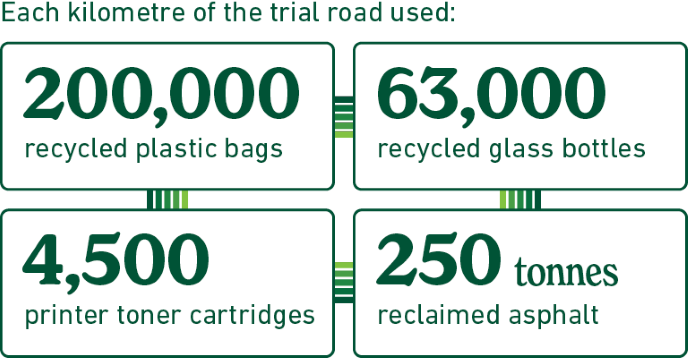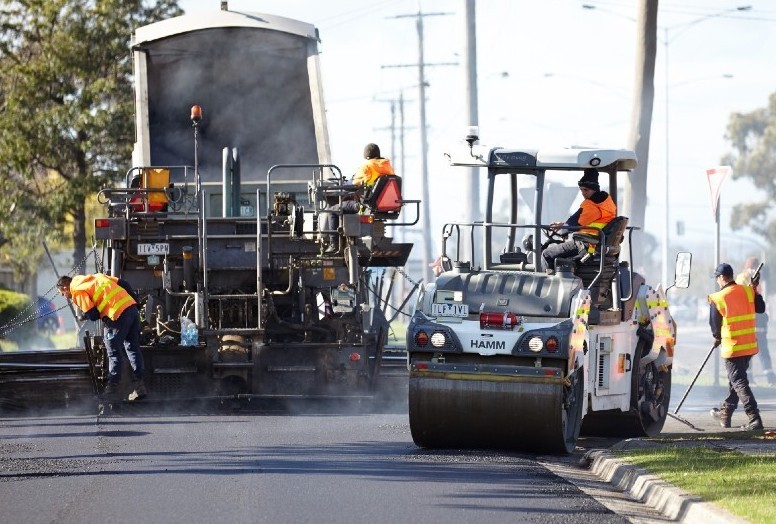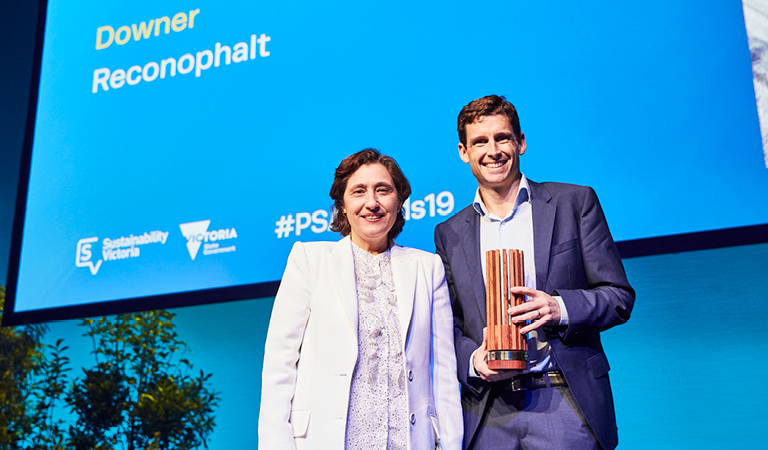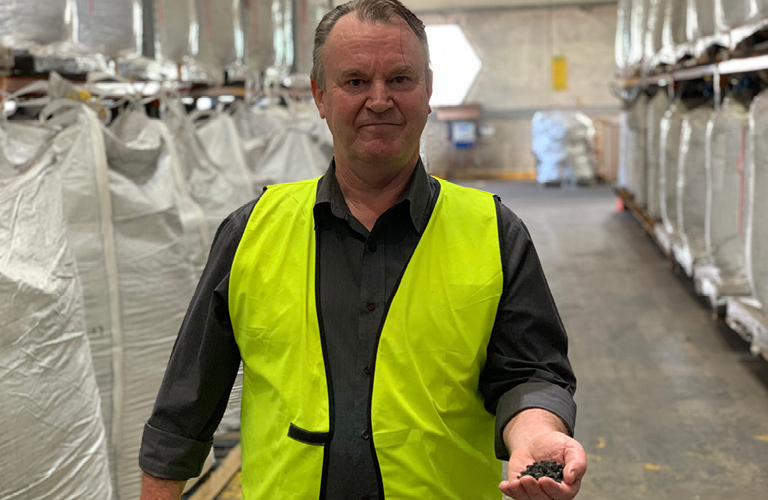SV20: From concept to commercialisation
In 2025, Sustainability Victoria (SV) is celebrating 20 years of changing what’s possible. We’re looking back at some of our most memorable, exciting and transformative projects delivered on behalf of the Victorian Government.

Reconophalt recycled asphalt
What we did
In 2018, Sustainability Victoria invested in a trial of Australia’s first asphalt additive made entirely from recycled materials, developed by Downer and Close the Loop and supported by Hume City Council. It was one of a series of grants to support the development of the recycled asphalt product.
Making recycling work means giving recycled materials new life. Sustainability Victoria has collaborated across sectors to accelerate and commercialise new uses for recycled materials, building confidence in their performance as an alternative to virgin materials. We’re now seeing these products used in the real world, as part of projects like Victoria’s Big Build.
Why it matters
We’ve ensured the best ideas don’t stay stuck on paper. This is one of hundreds of research, development and demonstration projects we’ve invested in, partnering with universities, industry and all levels of government to unlock innovation and build confidence in sustainability, transforming research and trials into real-world impact.

20 years championing innovation with recycled materials
The idea came to life in 2015 on a dusty road in Texas.
Steve Morriss, founder of circular economy company Close the Loop, had travelled to the United States to investigate a demonstration road made with recycled asphalt, abandoned by an American university research team.
‘As the data started to show itself, the excitement welled up and was growing inside us,’ Morriss recalls. ‘The results were unequivocally powerful. That was very exciting, to realise that we were onto something.’
Morriss’s vision for Victoria’s roads started with the simple goal: to recycle the toner from printer cartridges – what he describes as a ‘dirty black powder’, but he saw its value as a polymer that could find new life through remanufacture in asphalt. He knocked on doors of Australian industry, bringing evidence of the toner-enhanced asphalt improved performance, but was turned away, the product being dismissed as an idea for ‘tree huggers’, he says.
It was construction engineering giant Downer that saw the value and partnered with Close the Loop to develop and test a formula for the new product.
‘Steve helped us open our eyes to what could be,’ says Stuart Billing, Downer’s Executive General Manager of Transport and Infrastructure. ‘We worked with our R&D team to understand the properties of toner and how it could improve asphalt. Then we figured out how to get it into a form we could actually use.’
The result was ‘Reconophalt’, made with recycled soft plastics, printer cartridge toner, and crushed glass.
Sustainability Victoria provided a grant for the development of a field trial, which was laid on Rayfield Avenue, Craigieburn in 2018, providing proof of concept for the product to meet VicRoads specifications and ultimately be scaled, commercialised and made available for use in Victoria’s major roads projects.
 The trial Reconophalt road is laid in Craigieburn in May 2018.
The trial Reconophalt road is laid in Craigieburn in May 2018. The transformation:
Reshaping our world with recycled materials
Sustainability Victoria’s work championing innovation and research has helped shift recycled materials from niche alternatives to credible, high-performance options.
Ten years on, roads using Reconophalt have been laid across Victoria, New South Wales and South Australia, including as part of the recent M80 and Monash Freeway upgrades.
Critically, Reconophalt provides up to 65% greater fatigue resistance than standard asphalt, and superior resistance to deformation for withstanding heavy traffic. And, despite public curiosity, the roads look just like any other.
‘People expect to see pieces of plastic sticking out of the road,’ says Billing. 'However it looks like any other asphalt, and that’s exactly what we like to see.’
‘We’ve always held the mantra that recycled products must perform as well, if not better, than the standard equivalent. If it doesn’t, we don’t proceed.’
As recycled materials become the norm, the evidence base grows and the market expands.
Reconophalt is just one of the recycled material innovations backed by SV grant funding – consider the Mordialloc noise walls project, Victoria’s beer bottle road to a circular economy, ROBOVOID concrete void formers and Porous Lane permeable pavement.
We’ve been an early mover, investing to validate recycled materials against performance standards and supporting the use of more than 3 million tonnes of recycled material in infrastructure. This has laid the foundation for the work of newer public sector agencies like Ecologiq, driving the Victorian Government’s Recycled First policy, which mandates that all major transport projects optimise the use of recycled and reused materials.
 Downer won a Premier's Sustainability Award in 2019 for its innovative recycled asphalt product, Reconophalt, in the large business category.
Downer won a Premier's Sustainability Award in 2019 for its innovative recycled asphalt product, Reconophalt, in the large business category. The impact:
De-risking and tackling misconceptions about recycled materials
Innovation is risky, but Sustainability Victoria has made it less so by funding dozens of research and development projects and driving new markets to ensure commercial viability for recycled materials.
‘De-risking is critical’ notes Suzanne Toumbourou, CEO Australian Council of Recycling, ‘given that innovative materials face a whole lot of barriers when it comes to procurement, sometimes price barriers, but more often, barriers relating to specifications and standards and just “status quo” ways of doing things.’
Downer’s Stuart Billing explains that there are often costs involved in taking steps forward, noting that ‘government support has helped us modify our plants and processes to make Reconophalt viable.’
‘Helping decision-makers to feel that adopting more sustainable and innovative materials is going to be a change that's safe for them is important. And government supporting them through that process is invaluable.’
Increased industry appetite to invest in commercialising recycled products needs to be matched with demand and confidence from buyers, ensuring markets for recycled materials grow.
Sustainability Victoria’s Buy Circular service (formerly Buy Recycled) supports councils to purchase circular and recycled products – including Reconophalt – for use in local infrastructure, landscaping, and parks. With access to over 130 suppliers via the Buy Circular Directory, councils can find products that meet their specifications and sustainability goals, helping them to overcome barriers to using recycled products like Reconophalt.
 Steve Morriss at Close the Loop.
Steve Morriss at Close the Loop. The big picture:
Championing research and innovation
Sustainability Victoria has provided seed funding for the research and innovation needed to identify the sustainability initiatives that Victoria should invest in next, proving that innovation can reshape entire industries.
Through strategic investment, rigorous trials, and fostering collaboration with industry, government, and research partners, we’ve proven that sustainability works.
‘Sustainability Victoria has been a fantastic voice within government. They’ve helped raise the profile of sustainability in industry and opened doors that weren’t open before.’
The collaboration between Close the Loop and Downer on Reconophalt is an example of how partnerships can bridge the gap between ambition and execution, from early ideas to real-world applications. These collaborations don’t just validate performance, they build confidence, unlock investment, and create shared ownership of sustainability outcomes.
‘It’s not just the money that comes through SV, but the partnerships that are brokered through Sustainability Victoria as well’ says Suzanne Toumbourou, CEO Australian Council of Recycling.
And, support from government can be pivotal in getting even the most unconventional new ideas over the line, Steve Morriss explains.
‘Sustainability Victoria has helped with grant funding on numerous occasions and equipment as well. It's helped give the whole project credibility. You know if the government sees fit to back a product, then it's a valid technology. It gives our board the confidence to move forward,’ he says.
‘We’re asking other governments to set up an agency like Sustainability Victoria so we can see more of this enabling function across the country. Victoria got off to a good start 20 years ago’
The future:
From recycling to circularity
Recycling – and finding new life for recycled materials – is just the beginning.
With this foundation in place, Victoria is increasingly turning its attention a truly circular economy, where materials are kept in use for as long as possible and waste is designed out from the start. It’s not just about how we divert from landfill, but how we rethink value, innovation, and impact for generations to come.
Circular products like Reconophalt, with 100% recyclability at end-of-life, enhanced performance, and no increased environmental risk, are an important step on this road to circularity.
‘I think we’ve been able to prove that we can deliver circular materials through the recycling sector. We’ve proven that they can be fit for purpose, and now we need to scale the markets for uptake.’
Reconophalt’s recognition as winner in the Large Business category at the 2019 Premier’s Sustainability Awards highlighted its significance as an innovation of its time, literally paving the way for a future where we design out waste.
Steve Morriss, founder of Close the Loop, reflected on the journey from that dusty road in Texas.
‘It really is an Australian and Victorian success story’ he says. ‘With a lot of help along the way from Sustainability Victoria.’
-
Steve Morriss:
Close the Loop is a resource recovery company. We specialise in collection and recycling of imaging supplies.
Close the Loop was founded on the brand promise 'Zero waste of landfill'. That brand promise has driven a lot of innovation within our organisation, so that today we lead the world on reuse solutions for a very complex waste stream.
We employ around 75 people here and 125, roughly, in the USA. Close the Loop is the most successful example of voluntary product stewardship in this country.
Manufacturers are encouraged to take responsibility for their products for the whole of life.
Business intelligence is a big part of our collection and recycling programs. We have to be able to verify where the cartridges have come from.
Collaboration is key to success in the circular economy. A good example of that is Close the Loop's partnership with Downer. TonerPave is a new asphalt, with high recycled content and reduced carbon footprint.
Downer provides road services throughout Australia and New Zealand, and is a leading producer of asphalt. TonerPave is the result of a shared culture of innovation between Downer and Close the Loop. This collaborative partnership delivers lower cost, higher quality roads using post-consumer recycled materials.
Victoria has been a good place for Close the Loop to locate because Victoria has been, and remains, a key manufacturing hub. There are lots of good factories around, there's good quality labor available in Victoria and we find it very easy to do business with government in Victoria as well.
Close the Loop has a strong focus on R & D, and we always have had. We lead the world in resource recovery from what is a very complex waste stream due to our culture of R & D innovation and determination.
More stories from 20 years of SV
20 years of changing what’s possible
For two decades, we have led the way to a sustainable future – cutting waste, driving down emissions, and turning policy into real action across homes, communities, and businesses.
But none of it happens without you, Victoria. Your choices. Your drive. Your belief in a better way.